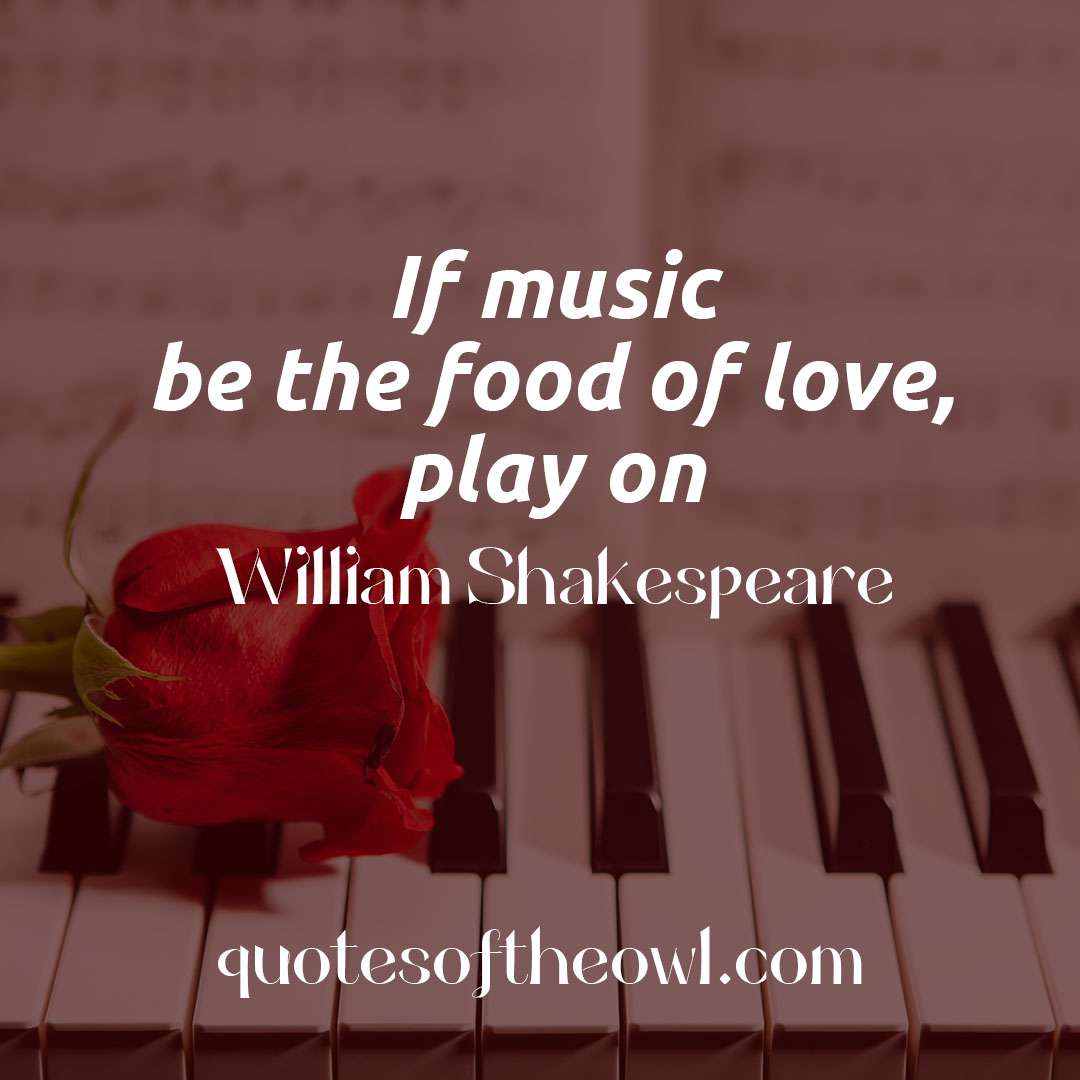What is the meaning of William Shakespeare’s Quote: “If music be the food of love, play on”?
In the world of literature and poetry, William Shakespeare’s name stands tall and proud, and his words continue to resonate through the ages. One such famous quote from Shakespeare’s play “Twelfth Night” is “If music be the food of love, play on.” This profound and timeless line has captured the hearts of many and stirred countless emotions. In this article, we delve deep into the meaning behind this beautiful quote, explore its context within the play, and examine its significance in our lives today.
The Context of the Quote
In Shakespeare’s play “Twelfth Night,” the character Duke Orsino utters the famous line, “If music be the food of love, play on,” at the beginning of the play. The Duke, deeply in love with the countess Olivia, sends his servants to serenade her in an attempt to woo her heart. However, Olivia is mourning the loss of her brother and is not ready to entertain any romantic advances. It is in this context that the Duke ponders the power of music and its ability to influence love.
Must Read Book: The Complete Works of William Shakespeare
The Interpretation of the Quote
The quote itself carries a profound meaning that has been subject to various interpretations over the centuries. At its core, it suggests that music has the power to fuel and nourish the flames of love. The Duke’s yearning for love is likened to an insatiable appetite, and music is portrayed as the sustenance that can satiate this hunger. The word “play” takes on a dual meaning here – both referring to the playing of music and also to the idea of playing with emotions and desires.
The Impact of Music on Emotions
Music has always been closely associated with human emotions. It can evoke joy, sadness, nostalgia, or even a sense of longing. The melody and rhythm of music have the ability to strike a chord deep within our hearts, resonating with our innermost feelings. In this sense, music becomes a vessel through which love can be expressed and experienced.
The Universality of Love and Music
One of the reasons why this quote remains relevant today is its universality. Love and music are two aspects of human existence that transcend time, culture, and language barriers. Throughout history, people from diverse backgrounds have used music as a means to express their emotions, especially those associated with love. This quote, therefore, serves as a reminder of the timeless connection between music and matters of the heart.
Music as an Expression of Passion
Shakespeare’s quote not only alludes to the connection between music and love but also suggests that music intensifies the experience of love. Passionate emotions can often find their outlet in music, and many artists have used their craft to express their deepest affections. The intensity of emotions conveyed through music can create an everlasting impact on both the listener and the creator.
The Role of Music in Love’s Journey
As we explore the meaning of the quote, it becomes evident that music plays a significant role in the journey of love. It has the power to kindle love’s flames, sustain its fire, and even heal its wounds. Music becomes a companion to love, accompanying it through moments of elation and sorrow. The Duke’s yearning for Olivia finds solace in music, as he uses it as a channel to externalize his emotions.
Music as a Source of Comfort
Beyond its role in igniting passion, music also acts as a source of comfort in times of heartbreak. When love goes unrequited or when relationships face challenges, music becomes a consoling companion. People often turn to music to find solace and understanding, as it can articulate the emotions they struggle to express.
The Influence of Music on Memories
Another intriguing aspect of the quote lies in the connection between music and memories. Certain songs become entwined with our experiences, reminding us of moments filled with love and joy. These musical memories have the power to transport us back in time, rekindling old emotions and reconnecting us with our past selves.
Contemporary Relevance
In today’s world, where music is more accessible than ever, the quote’s relevance remains intact. With various genres and styles, music caters to a diverse audience, each finding their own meaning in the melodies they cherish. Whether through live performances, digital platforms, or personal playlists, music continues to shape our experiences and emotions.
Conclusion
William Shakespeare’s quote, “If music be the food of love, play on,” transcends time and holds true to this day. It serves as a reminder of the profound connection between music and love, as well as the power of music to move and inspire. In a world where emotions often find their expression through art, music remains a powerful conduit for matters of the heart.

